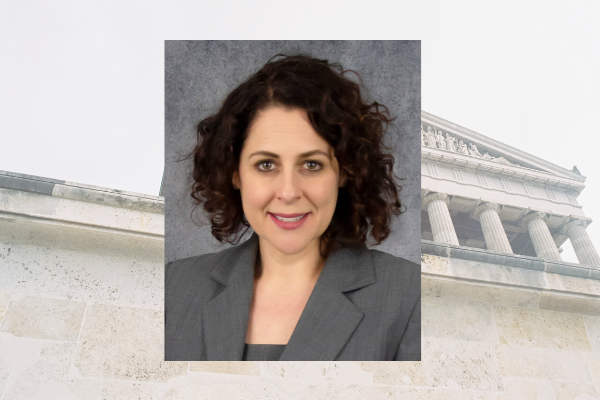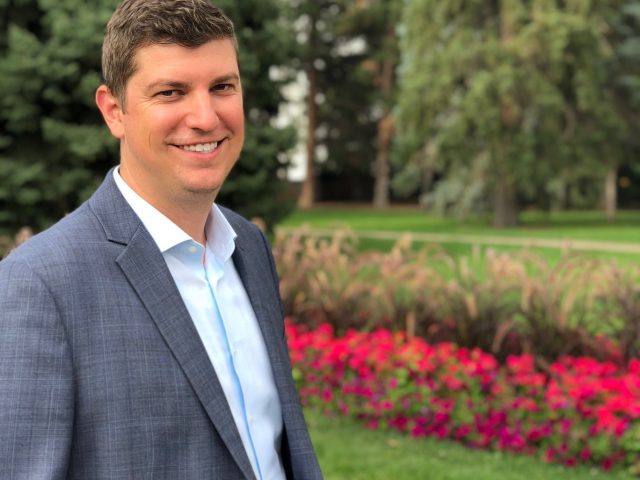Name: Polly Beeson
Location: Indianapolis, IN
What do you do?
My current role is Staff Attorney for Marion Superior Court. I advise the judges about policymaking and ideas to make improvements to existing court operations ahead of our move to a new courthouse in December 2021.
What’s a typical day like for you?
Pre-Covid, I began my day with other colleagues in court administration discussing our current projects over coffee. This was one of my favorite parts of the day. The coffee meetings started organically when a new Starbucks opened up nearby and became a routine after realizing how productive it was. The conversations really set the tone for the whole day. It worked out really well because it was an opportunity for us to voice our ideas/questions/concerns with each other away from the courthouse. Some of our best ideas have come from this casual environment.
I spend most of the day in my office, located in Court Administration where I work on projects, anticipate judges’ questions, or offer advice to the judges or other court administration colleagues. A lot of my day includes impromptu meetings required to address an immediate situation.
In Covid, it’s a lot of the same thing although I’m doing a lot more independent work and less meetings. When I say meetings, I mean working meetings. It used to be my court administration colleagues and me who would find it productive to just sit down and hash things out. Now I’m just doing it a little more independently, but my schedule is still filled with a lot of remote meetings to keep operations moving forward. I work with the Supreme Court on various projects or initiatives, court administrators across the country and other people who do jobs like mine just to learn about how they operate. I engage with national consultants to learn about national best-practices for ways Marion Superior Court operations can improve.
What do you like most about what you do?
What I like most about it is being able to have a part in structuring a court system. The judges make the decisions, so I do my best to give them the tools so they can make informed decisions. I like being a part of a court system that is trying hard to listen to everybody and respond to the needs of the litigants. Having a part in that process is fun and rewarding, especially since I was once in the courtroom and in the trenches everyday representing people who could get lost trying to navigate the court systems.
What inspired you to join the legal profession?
As an undergrad at Purdue University in the business school, I had to take a course in business law. I had an adjunct professor that was a local attorney from Lafayette, IN who had a catch all practice. I found his legal war stories fascinating and fun to learn about. He encouraged me to think about law school, so I got a job working in the probation department in Tippecanoe County, Indiana. I was a probation assistant writing presentence reports and doing probation meetings and that kind of solidified it for me. I really liked the courthouse and thought it was a fun place to be!
How do you define success?
Fulfillment. I think fulfillment is the most successful thing anyone can achieve. It is the balance of everything including feeling appreciation, being able to spend time with my family, or accomplishing a major project. The great thing is that it can change, because it is a fluid goal. My goals for fulfillment have changed many times over my career. I once wanted to do as many trials as possible, when now I hope to be able to put my kids to bed every night. All of this drives my overall fulfillment.
What’s been the greatest challenge on your path and how did you work through it?
When I was in private practice, I was in talks to join a law firm, and the day of my first interview with the firm I found out I was pregnant with twins. I went to three or four rounds of interviews with this law firm. I ended up not getting the job. They hired someone with a completely different portfolio of cases. I practiced criminal defense and family law and she practiced environmental law. I was heartbroken. I had convinced myself that was my path forward as a lawyer. I ended up looking at other opportunities and landed upon this court administration role. And when I got hired into the job, I was actually hired in for a completely different role, where I was the director of the Arrestee Processing Center. It was a step in my career that I just wasn’t expecting. And it worked out! I have worked with Marion Superior Court for several years and have been gradually more fulfilled in the most unexpected way, mostly because it was a job that has provided me the opportunity to be with my family.
What has been your proudest moment professionally?
Well I look at everything I do as part of a team, and when I was in law school, I had the opportunity to participate in the Wrongful Convictions Clinic. There I worked with one of my greatest mentors – Fran Watson. Two guys from Lake County, Indiana were wrongfully convicted of a rape around 1990. There were many levels to this case – DNA evidence improperly used, snitch testimony, eye-witness misidentification, junk science. It had all of the makings of a wrongful conviction. We went to a post-conviction relief hearing in Lake County and lost. During that time, I got to know a lot about the case and the clients. I spent a lot of time getting to know one of them, Roosevelt Glenn and his family. Afterwards, I stayed in touch with them and loosely involved in their case. Eight years later, they were finally exonerated. While I was more of a bystander at that point, I am incredibly proud of that experience. It wasn’t easy to experience defeat like that so early into my legal career, but the payoff was there in the end. I was able to take what I learned about resilience from Roosevelt and Fran and channel it into a desire to learn more and be the best attorney my clients could get. It still motivates me from the Court perspective to make sure that every litigant is afforded the access to justice they deserve. I am also so proud to be a member of the team of people over the years who had a part in helping these men clear their names.
What do you enjoy doing outside of work?
Endurance racing such as running, swimming, biking and triathlons. I did Ironman races before I had kids. It’s a dream of mine to do another one post-birth, but it has been challenging to fit the training into my day with my workload and taking care of the kids. Our family is a biking family. My husband was a competitive cyclist. He came from a cycling family and grew up on a bike. My twins and stepson also love being on bikes.
What’s your go-to wellbeing activity?
Endurance racing or watercolor! I just picked up watercolor during the pandemic and it has been so grounding in a stressful time because I can just get lost in a picture and pay attention to tiny details.
The best book you’ve read or podcast you’ve listened to recently?
There was a really good Brene Brown podcast where she interviewed Harriet Lerner who is the author of a book about apologizing. It was two and half hours, split between two episodes where they worked through difficult conversations and issues people often confront. It was mind-blowing and relevant to every aspect of my life – how I talk to my husband, how I talk to my kids, how I talk to my mom, how I engage with my coworkers. It has even changed how I perceive other people engaging in conversations together. I’m now able to handle situations very differently.
What is one thing about you that you think people would be surprised to learn?
That I did an ironman. I’m not that person anymore so it’s very different. You have to give yourself much more than an hour a day to do that and now I drive a minivan (lol). And it takes a different mindset than I have right now.
If you could wave a magic wand and change one thing about the legal profession, what would it be?
I would want to see more resources put towards indigent representation to remove the stigma of the quality of representation those people receive. I think there is an unfair attitude towards public servants that they aren’t smart enough to have a high-paying job, when many people who choose that path do so to follow their own dreams. I have always taken offense to that as a former public defender, and some of the best lawyers I know are public servants or work in the non-profit legal community.
What is one new thing you are hoping to learn from others in this community?
One thing I’ve learned from OPLN and one thing I wanted to get was a general understanding of other lawyer’s perspectives in the legal community. For example, when I asked the question in the community about what everyone envisions from their court hearings, I was actually surprised to get the responses that I did. We all have different perspectives and being able to have a forum to share those is unique. I welcome the positive and helpful conversations in an otherwise contentious profession.
I find that it is always insightful to be able to engage with other lawyers outside of Indianapolis. It’s not as easy to network with others outside of your local community and OPLN provides me with the opportunity to do that.








